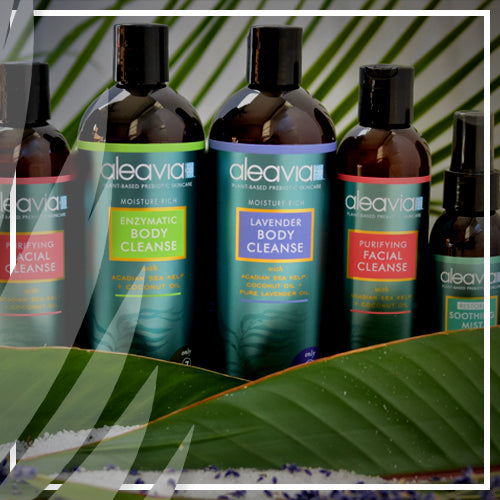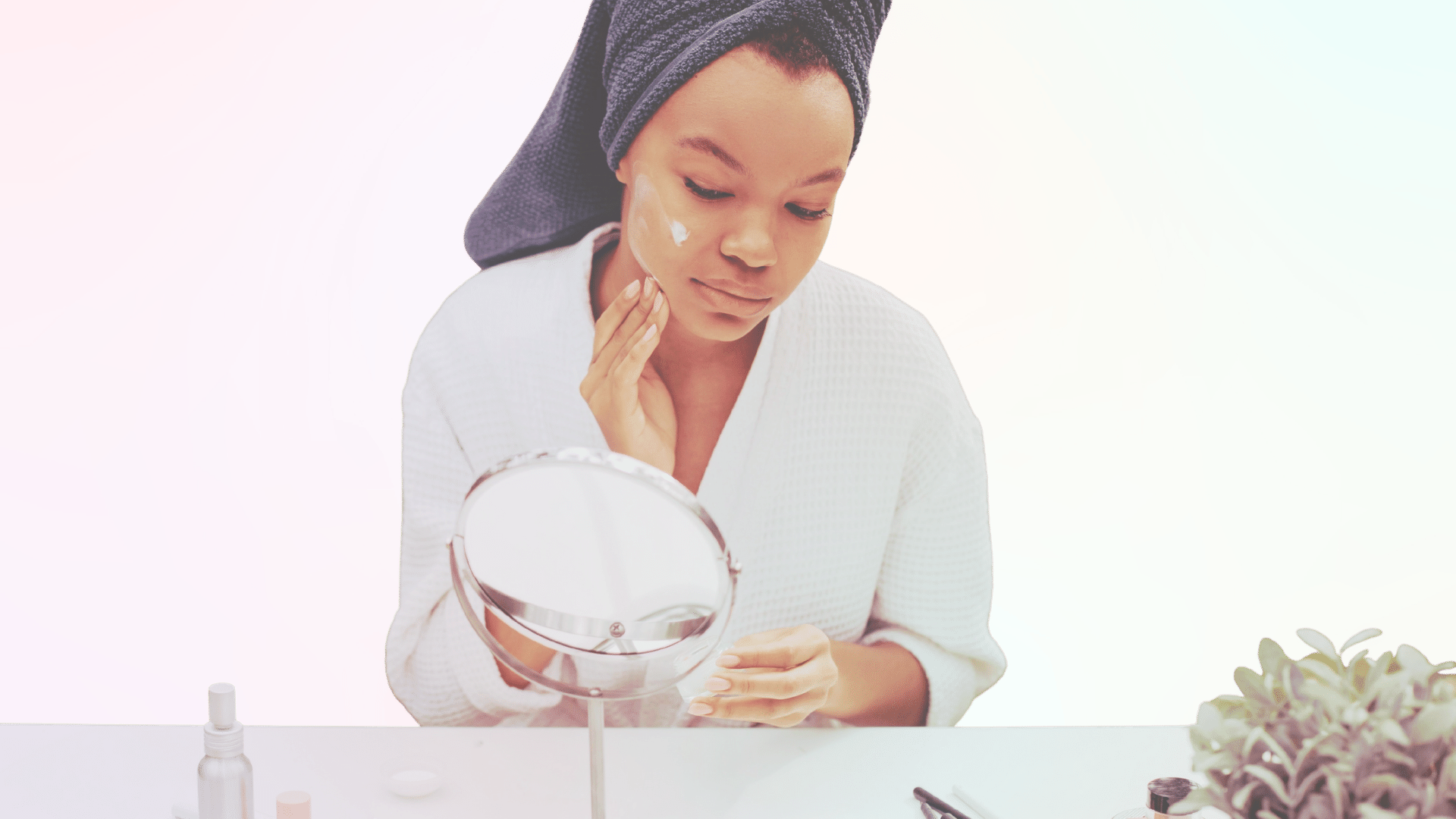
The post is the definitive guide on how to restore your skin microbiome.
If you struggle with persistent skin conditions, irritation, or skin dryness, the issue may lie in your skin microbiome. But what exactly is it, and how do you restore your skin microbiome if it's out of balance?
In this post, you’ll learn:
- What the skin microbiome is and why it’s important.
- The benefits of restoring your skin microbiome to good health.
- How to restore your skin microbiome.
Let’s dive in!
TABLE OF CONTENTS
Disclaimer: The benefits of prebiotic skincare and Aleavia specifically have been positively vetted and approved by board-certified dermatologists and medical doctors. However, we always recommend consulting your primary care physician or board-certified dermatologist before making major health changes.
While the skin is the largest organ on the body, it’s also probably the most underrated.
Think of all the critical roles your skin plays in your health.
- It protects you from foreign invaders
- It regulates your body temperature
- It helps protect you from harmful microorganisms and keeps your skin microbiome (your microbial flora) healthy
Your skin microbiome is full of “good” bacteria and fungi that play an essential role in keeping your skin healthy.
When the balance of these microbes is disturbed, it can cause various conditions such as acne, rosacea, eczema, or more serious skin conditions. To combat these problems, you need to understand and address what’s going on within your skin microbiome.
What is the skin microbiome?
The skin microbiome is the collection of microrganisms - such as bacteria, fungi, and sometimes viruses - that live on your skin.
You've probably heard people talk about the gut microbiome, leaky gut issues, and how holistic healing begins with gut health.
What all of these terms point to is the health of the microbiome - the symbiotic community of bacteria in your gut that keep your digestion (and many other crucial bodily functions) running smoothly.
The same principle applies to the skin microbiome.
Think of your skin as a rainforest where the organisms survive in a mutually beneficial relationship.
It is important to note that the skin on different body parts is home to different microbiomes. For instance, the microbiome on the skin on your face is very different from the microbiome on the skin of your hands, armpits, back, feet, etc.
Bacteria has gotten a bad rap in medicine. Without good bacteria, our skin (and bodies as a whole) would be in bad shape.
The good bacteria help make your skin look fresh, plump, healthy, and bright. Apart from bacteria, your skin also hosts some fungi and viruses (yes, there are good viruses!) that team up with the bacteria and form barriers to protect your skin from other agents and pathogens.
Healing your skin from the inside out requires a deep understanding of the following:
- Your particular skin microbiome and what it responds well to
- Your skin's pH levels
- Your skin type (dry, oily, combination)
When understanding your skin microbiome, your skin type (dry, oily, combination) and your skin's pH levels are two of the most important factors to study.
Why is a healthy skin microbiome important?
A healthy skin microbiome is important because it:
- Strengthens the immune system.
- Helps the skin absorb healthy nutrients.
- Helps retain moisture in the skin.
- And can heal common skin conditions and wounds.
Let's explore each of these in a bit more detail.
A healthy microbiome strengthens the immune system
Apart from preventing harmful pathogens from seeping in via the skin, your skin microbiome also helps control your skin immunity and support your skin barrier.
Interestingly, these microorganisms exist deep into the dermis and play a key role in communicating with our immune system.
A healthy microbiome helps with nutrient absorption
A healthy skin microbiome is crucial for nutrient absorption, making your skin look fresh and bright.
For instance, the topical treatments you use for your skin will be absorbed by your skin only if your skin microbiome is potent and strong enough.
A healthy microbiome locks moisture in
In addition to this, a healthy skin barrier helps keep the moisture in and hydrates the skin, which helps protect the body against infections, cleanses the body, and keeps diseases at bay.
A healthy microbiome helps heal skin conditions and wounds
Since the skin microbiome communicates directly with the immune system, it plays a significant role in helping heal wounds faster and brings down inflammation.
Just like a well-balanced gut microbiome can alleviate several health issues, so can a balanced skin microbiome.
In fact, medical professionals are only beginning to understand the incredible connection between gut health and skin health, called the "gut-skin axis."
More and more studies like this one are being conducted and published as we discover just how deep the relationship between gut and skin health goes.
How to restore your skin microbiome
Step 1. Avoid the factors that disturb the skin microbiome
The following habits and practices play an integral role in creating an imbalance in your skin microbiome and disturbing the pH levels on your skin:
- Using harsh soaps: Harsh and highly alkaline soaps and face washes can disrupt the skin's pH level. Opt instead for prebiotic skincare products that feed your skin's microbiome rather than strip it away.
- Using wrong skincare products: Not understanding your skin type and using a cocktail of random skincare products can send your skin microbiome into an overdrive. Overdoing your skincare or over-exfoliating your skin can also contribute to the same.
- Irritants: Perfumes or perfumed skincare products like face washes, creams, and serums can irritate the skin (source). That's why none of our products include artificial fragrances.
- High sun exposure: Excessive exposure to harsh sun, UV rays, and blue light have been known to damage the skin microbiome.
An unhealthy and unbalanced skin microbiome can cause skin diseases like dermatitis, eczema, acne, rosacea, and psoriasis, among many others.
Step 2. Be intentional about implementing healthy microbiome habits
You can make simple changes in your life that can restore your skin microbiome and help make your skin clearer, brighter, firmer, and more supple. Some of these include:
- Use gentle skincare products: Avoid harsh soaps and shift to soft "cleansers" instead. Look for plant-based or prebiotic products that feed your skin's healthy bacteria. Don't overdo when it comes to using actives and exfoliation.
- Change your diet: Identify any trigger foods that contribute to an inflammation on your skin like gluten, dairy, nuts, etc. Add more probiotics for a healthy skin microbiome. Here's a list of some foods that fight inflammation.
- Stay hydrated: Drink enough water and cut out excess salt and sugar from your diet.
- Incorporate prebiotics and probiotics into your diet: Even if you don't like the taste of fermentation, there are lots of probiotic and prebiotic foods that can help restore your gut (and skin) microbiome.
How microbiome skincare affects skin conditions

The microbiome is closely tied to common skin conditions like acne, psoriasis, and rosacea. Let's get into the specifics of how these are related.
How is acne related to your skin microbiome?
Acne vulgaris is a skin condition wherein excess sebum secretion, closed comedones, and inflammation target healthy skin.
The condition develops primarily due to unregulated microbial activity on the skin, which is one of the results of an unhealthy skin microbiome.
Propionibacterium acnes is a part of the skin microbiome and contributes to healthy skin. It is caused by Propionibacterium acnes and Malassezia spp., which are found in sebaceous skin areas.
However, the bacterium produces propionic acid, which helps break down the fat released from the sebaceous glands. The free fatty acids then form closed comedones, which develop into acne.
Excess sebum production or unhealthy skin microbiome can cause Propionibacterium acnes to become pathogenic. A study has found that pathogenic bacteria can change the sebum composition, giving rise to acne.
How is eczema related to your skin microbiome?
Eczema is marked by dry, itchy, and scaly skin patches resulting from inflammation. Also known as atopic dermatitis, this is a condition where the skin loses moisture, becoming quickly dry and irritated.
There are several agents that irritate the skin microbiome, which causes eczema, including allergens, perfumes, chemicals, harsh soaps, infections, etc.
Studies have also found that patients with eczema lack diversity in their skin microbiome. The absence of necessary microorganisms on the skin can disturb the skin barrier, cause inflammation, and leak moisture.
Frequently Asked Questions about the Skin Microbiome
How has the pandemic affected our skin microbiomes?
The coronavirus pandemic in early 2020 heightened the world's sensitivity to maintaining "ultra-hygienic" conditions.
Since then, everyone around us has resorted to washing hands over a dozen times and frequently using sand sanitizer throughout the day.
Unfortunately, that's not ideal for the skin microbiome.
Most hand sanitizers use alcohol as their base, which destroys the balance between the organisms in your skin microbiome. In addition to this, the soaps generally available in the market are highly alkaline, with pH levels ranging to 10.
So, while washing hands frequently with soap might be necessary due to the COVID-19 pandemic, it disturbs the acidic pH of the skin, making it more prone to infection. It may also strip your skin of natural oils.
The lack of healthy bacteria on the skin to fight pathogens makes the body vulnerable to several contaminants that can cause inflammation and infections.
However, it must be noted that frequent washing and sanitizing does not strip the skin microbiome that resides deep into the skin's epidermis.
What bacteria is good for your skin microbiome?
The skin microbiome, also known as the "skin flora," consists of good, skin-friendly bacteria. While there are thousands of such bacteria on different areas of the body, some include:
- Staphylococcus epidermidis: Widely found on the skin, this bacterium helps produce antimicrobial peptides that fight pathogen growth on the skin. However, it can become a pathogen and attack the body if the skin pH is disturbed.
- Lactobacilli: This bacterium is a significant contributor to healthy skin, and its absence can cause skin diseases like psoriasis or atopic dermatitis.
- Bifidobacterium: This helps reduce the sensitivity of the skin.
- Streptococcus thermophilus: Helps boost ceramide production in the skin and counter skin dryness.
What is the skin's natural pH level?
A healthy skin microbiome has a pH level of 5, which is slightly acidic to curb the growth of pathogens on the skin.
In case you don't remember from highschool chemistry, the term "pH" in pH level refers to the "potential of hydrogen" and is measured on a scale of 0 to 14.
Levels ranging from 0 to 6 are considered acidic, levels from 8 to 14 are considered fundamental, and a pH of 7 is considered neutral.
However, it is essential to remember that the skin's pH keeps on changing according to a person's:
- Age.
- Hormone surges.
- Gender.
- Infections.
- Or when using harsh soaps and topical solutions.
Therefore, it is always recommended to use skincare products that are gentle and do not compromise the skin's average pH level.
Skin microbiome products
If you're looking for all-natural, plant-based skincare products designed to heal the microbiome - well, that's kind of our bread n' butter.
Our body washes, lotions, and mists are all designed to help you heal your skin from the inside out - and it all starts with a healthy microbiome.
If you want to learn more about how prebiotic skincare can help you restore your skin microbiome, check out our post on the topic here.
If you're ready to explore our line of all-natural, plant-based skincare products, you can shop now.






